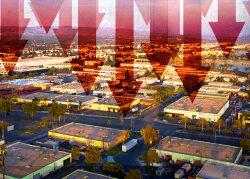Warehouse space is still harder to find than a parking spot in Times Square, but the U.S. industrial market is poised to cool off.
While demand for industrial space continues to outpace supply, the market is not likely to remain this tight, given the slowing economy, according to a second-quarter report from Newmark.
Industrial absorption topped 100 million square feet for the fifth straight quarter, meaning more space was leased than was added to the market. But the figure for the second quarter, 101.3 million square feet, was down 17 percent from the first quarter’s 121.8 million and 13 percent below what it was a year ago.
Still, the positive absorption pushed vacancy down 20 basis points nationally to 3.7 percent, a new record low. A year ago it was 5 percent. Almost 30 percent of the markets Newmark tracks are experiencing vacancy at or below 3 percent, per the report.
Because of increased construction costs and a lack of available space, rents were up last quarter, rising 12.7 percent year-over-year to $9.56 per square foot.
Read more


Those trends aren’t expected to last. The World Bank has revised its global growth forecasts down to 2.9 percent for 2022, from the 4.1 percent it predicted in January, and the national industrial market is signaling a similar trajectory for the rest of the year.
Meanwhile, industrial developers have been adding space as fast as they can.
“Over the coming quarters, the deficit between net absorption and deliveries will tighten and reverse as consumer demand softens and construction deliveries rise, given the record-high construction pipeline,” the report reads.
Five markets have at least 30 million square feet of industrial space under construction, accounting for one-third of total square footage in the pipeline: Dallas, Southern California’s Inland Empire, Phoenix, Chicago and Pennsylvania’s I-81/I-78 corridor.
Nationally, the industrial construction pipeline increased 12.5 percent quarter-over-quarter to more than 613 million square feet, which represents 3.8 percent of total inventory. That figure was up 68 million square feet from the first quarter and nearly 195 million from the year-ago period.
Quarterly deliveries measured 72 million square feet, down from 86.2 million square feet in the first quarter and up from 67.5 million square feet in the second quarter of last year.
